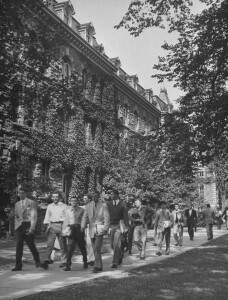Writing in the Spring 1952 issue of New Phineas, the magazine of University College, London, Gordon Snow, who spent a year at Cornell (above), was pleasantly surprised at what he found there.
The academic syllabus.
My first impression…was one of surprise at the liberty and freedom which the students were given in choosing their courses; it seemed as if there was none of the overspecialisation that some of the honours courses in England tend to fall into…Second impressions, however, revealed that defects did exist in the system; many of the arts courses are run to cater in part for agriculture or science or hotel-school students, who have to fulfil a certain number of requirements in the liberal arts, and , who consequently, may have an interest in the theory of a liberal education but very little enthusiasm in practice for their particular requirements. As a result, there is not a great deal of homogeneity in purpose, or interest in the very large arts lecture classes , and many of the students who have come to college for vocational training pure and simple find the arts courses irksome. Since there students may be as much of two-thirds of the class, the lectures have to be scaled down to their needs: hence the universal and horrifying use of enormous anthologies for particular periods of literature, expensive as all American books are, and with up to 1,400 pages in double columns of fine print. My own anthology consists of representative selections from American poetry and prose, from Captain John Smith to Ernest Hemingway, and the lecture has to eat his way at high pressure, through major and minor writers, three times a week, making his own selections for his students from among the selections in the book, and to a large extent predigesting critical reactions to them. Independent thought is not inhibited my this method of teaching, since I have come across many examples of it already, but it can scarcely said to be encouraged. To this extent, and to the extent that they continue a no-specialised study of several subjects, American colleges are a smooth continuation of the high schools and their methods; the students are given a very thorough grounding in he subjects taken at English grammar schools , wit the benefit of the maturer mind which the college student brings to them, and since there are as many Americans who go to college —or at lead begin college—as reach the Sixth Form of English schools, the universities here serve their purpose, a very different one from the English universities, well enough… Continue reading

